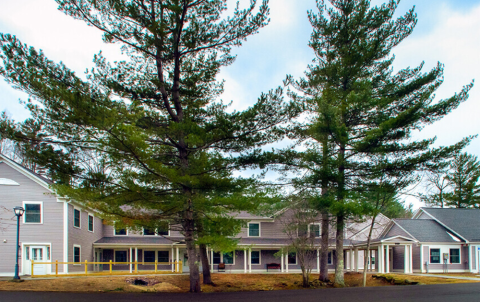VHFA joined housing partners in Williston last week to celebrate the completion of major renovations at Whitney Hill Homestead. The project, developed by Cathedral Square, preserves 44 apartments for older Vermonters. The event was also attended by former VHFA Executive Director Sarah Carpenter, who was CEO of Cathedral Square when Whitney Hill was first developed using VHFA-awarded tax credits in 1992. The renovation project received state and federal tax credits and loan awarded by VHFA.

“We are excited to be part of the revitalization of these apartments and of a community that will continue to serve as affordable homes for Vermonters in the decades to come. VHFA is honored to support the enduring stewardship of this property. Being surrounded by residents and seeing the shared pride in Whitney Hill Homestead is a powerful reminder of the community Vermonters can build around safe, decent, affordable homes,” remarked Seth Leonard, VHFA Managing Director of Community Development.
Renovations included energy efficiency upgrades such as new boilers, roofs, siding, and windows, as week as well as kitchens, bathrooms and flooring updates in the apartments. Residents were moved to local hotels for the duration of the work before returning to their homes.
Whitney Hill offers 37 apartments affordable to senior households at or below 60% AMI, including 20 with project-based rental assistance (PBRA) vouchers through the Vermont State Housing Authority to ensure affordability for very low-income households. All residents will have access to SASH (Support and Services at Home), a care-coordination program originally established by Cathedral Square for Vermont that helps residents live safely and independently.
“Today we celebrate the critical importance of high-quality, service-supported, affordable homes for older adults,” said Cathedral Square CEO Kim Fitzgerald. “Whitney Hill illustrates the importance of reinvesting in existing affordable housing in addition to building new housing in the state.”
The $6.4 million project received federal bond Low Income Housing Tax Credits and Vermont Affordable Housing Tax Credits awarded by VHFA. The project also received a $3.4 million temporary construction loan and a $1.7 million permanent loan from VHFA. Other funders included Vermont Housing & Conservation Board (VHCB), the National Housing Trust Fund, the Federal Home Loan Bank of Boston’s (FHLBB) Affordable Housing Program (AHP), and from Housing Ministries of New England (HMNE).

